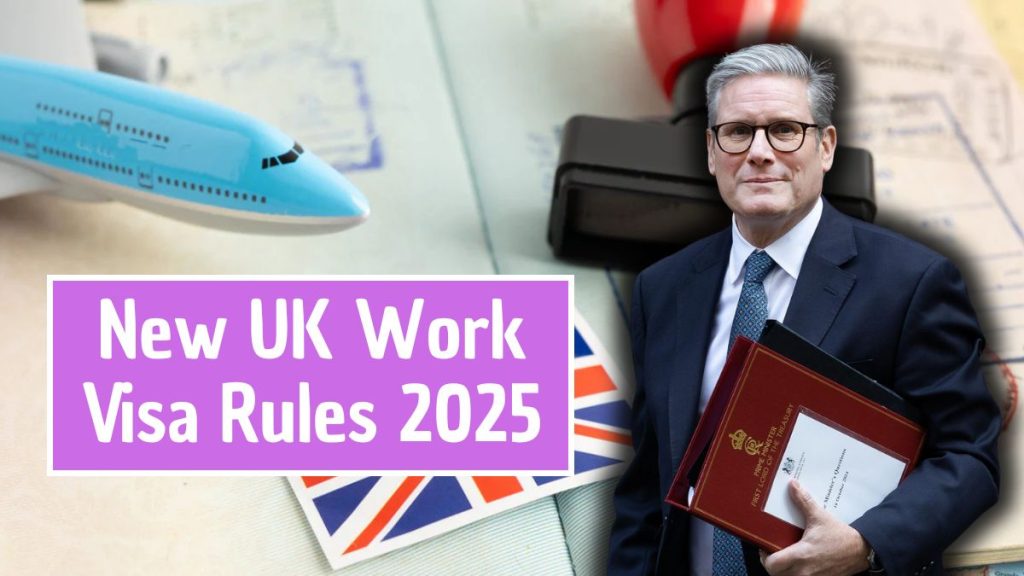Starting October 2025, the United Kingdom will begin accepting applications under its revised immigration system, reshaping how overseas workers enter the UK labour market. The new framework raises salary thresholds, tightens skill requirements, and refines non-sponsor visa routes — signalling a more selective but strategic approach to work-based migration.
The government says the goal is to balance control with competitiveness, ensuring that immigration supports high-skilled growth sectors while reducing reliance on lower-skilled roles. However, the outcome will depend on how effectively the new system is implemented and whether transitional protections ease the shift for existing applicants.
Overview of Key Policy Shifts

The updated immigration framework covers both sponsored visas like the Skilled Worker route and unsponsored visas such as the Graduate, High Potential Individual (HPI), and Global Talent visas.
From 22 July 2025, the general salary threshold for Skilled Worker visas rose to £41,700 per year, or the occupation’s official “going rate” — whichever is higher. Additionally, the required skill level increased from RQF Level 3 (A-level equivalent) to RQF Level 6 (degree equivalent), restricting eligibility to higher-qualification roles.
This means many mid-skill positions will no longer qualify unless specifically listed on the Temporary Shortage List (TSL).
The Skilled Worker Visa – What Has Changed
The Skilled Worker visa remains the UK’s main route for employers sponsoring overseas talent. However, several reforms have taken effect:
- Higher Salary Floor: Applicants must earn at least £41,700 or the role’s “going rate.”
- Increased Skill Requirement: Jobs must meet RQF Level 6 or above.
- Reduced Eligible Occupations: Many care, retail, and mid-level administrative roles are now excluded.
- End of Overseas Recruitment for Social Care Workers: New applications for this occupation ceased from 22 July 2025.
Applicants can still use tradeable points to offset requirements — such as holding a PhD, being a new entrant, or applying for roles on the Immigration Salary List — to qualify under slightly lower thresholds.
Visa Routes Without a Job Offer
The UK continues to support several routes that don’t require sponsorship or a pre-arranged job, offering flexibility for high-achieving individuals and young professionals. These include:
- Graduate Visa: For international students who completed a UK degree and wish to work or look for work.
- Global Talent Visa: For exceptional talent or promise in academia, arts, and technology.
- Youth Mobility Scheme: Allows citizens of specific countries aged 18–30 to live and work in the UK temporarily.
- High Potential Individual (HPI) Visa: For graduates of top global universities to work in the UK without sponsorship.
- Temporary Work Visas: Covering roles like Charity Worker, Creative Worker, Religious Worker, Government Authorised Exchange, and Seasonal Worker.
These pathways remain vital for sectors that rely on temporary, creative, or high-skilled international contributions.
Transitional & Legacy Protections for Current Visa Holders
To ease the transition, the Home Office introduced temporary protections for individuals and employers affected by the 2025 reforms.
Anyone who already held a Skilled Worker visa or a Certificate of Sponsorship (CoS) issued before 22 July 2025 can continue to extend or switch under previous salary and skill thresholds.
For example, in Scotland, Skilled Worker visa holders under old rules retain eligibility for extensions or changes without meeting the new RQF Level 6 or £41,700 threshold, provided their sponsorship pre-dates the rule change.
Application Process Under the New Rules
To apply successfully under the revised work visa framework, applicants should follow these core steps:
- Secure a Licensed Sponsor: For sponsored routes like Skilled Worker, obtain a Certificate of Sponsorship (CoS) from a UK employer.
- Meet English Language and Financial Requirements: Demonstrate English proficiency and adequate financial resources unless exempted.
- Submit Supporting Evidence: Include identification, qualifications, employment offer, and proof of salary.
- Apply Early: Applications can be submitted up to 3 months before the intended start date.
- Switch or Extend in the UK: Holders of other visas may switch to Skilled Worker if eligible, provided they apply before expiry.
Failure to meet the exact job code, salary, or skill requirements may result in rejection or sponsor penalties.
Visa Processing Times and Prioritization
For applicants outside the UK, decisions typically arrive within 3 weeks once all documents are correctly filed.
For switches or extensions within the UK, processing may take 6–8 weeks on average.
Priority services remain available for an additional fee, expediting the decision-making process — a key option for time-sensitive employment arrangements.
Compliance Challenges for Employers
UK employers sponsoring migrant workers face tighter compliance obligations.
They must ensure:
- Accurate job classification under the Standard Occupational Classification (SOC) system.
- Salary meets or exceeds both the general threshold and the occupation’s “going rate.”
- Record-keeping and reporting standards are strictly followed.
Non-compliance could result in licence suspension or revocation, affecting both current and future sponsorships.
Impacts and Concerns
The new rules aim to protect local jobs and promote skilled immigration but could create barriers for sectors reliant on mid-level roles.
- Reduced Eligibility: Many previous visa categories, such as mid-tier health and service jobs, no longer qualify.
- Increased Costs: Employers face higher salary obligations and compliance expenses.
- Recruitment Gaps: Shortage of qualified candidates in non-degree roles may widen.
- Uncertainty: Some applicants remain unclear on transitional eligibility, especially those midway through recruitment.
Industry experts say consistent communication from the Home Office will be crucial to prevent confusion and ensure smooth adaptation.
Recommendations for Prospective Applicants
To improve success chances under the October 2025 visa system, experts advise:
- Verify SOC Code: Match your job precisely with the correct occupation code.
- Check Salary Requirements: Ensure you meet both the £41,700 threshold and the occupation’s going rate.
- Review the TSL: Confirm if your role appears on the Temporary Shortage List for any exemptions.
- Consider Alternative Routes: If you don’t qualify for Skilled Worker, explore Graduate, HPI, or Global Talent visas.
- Consult Immigration Advisors: Expert guidance can clarify transitional provisions and improve application accuracy.
Looking Ahead: What to Expect
As the UK continues refining its points-based immigration system, these 2025–2026 adjustments reflect a focus on attracting highly skilled global talent while tightening access for lower-skilled work.
The next few months will reveal whether the balance between control, fairness, and competitiveness has been achieved — or whether further reform will be needed to maintain the UK’s position as a leading destination for international professionals.
Summary Table of Major Updates
| Change | Detail |
|---|---|
| Skilled Worker Salary Threshold | Raised to £41,700 or the role’s “going rate” |
| Skill Requirement | Increased to RQF Level 6 (degree level) |
| Effective Date | 22 July 2025 |
| Applications Open | October 2025 |
| Shortage List | Only medium-skill roles listed on the Temporary Shortage List remain eligible |
| Non-Job-Offer Visas | Graduate, HPI, Global Talent, Youth Mobility, Temporary Work |
| Processing Time | 3 weeks (outside UK), up to 8 weeks (inside UK) |
| Transitional Protection | Applies to pre-22 July 2025 Skilled Worker holders |
FAQs: UK Work Visa Changes from October 2025
1. When can I apply for a UK work visa under the new rules?
Applications open from October 2025, covering revised Skilled Worker and non-sponsor visa routes.
2. What is the new salary requirement for Skilled Worker visas?
Applicants must earn at least £41,700 per year or the official “going rate” for their occupation, whichever is higher.
3. Do all visa routes require a job offer?
No. Routes like Graduate, High Potential Individual, and Global Talent do not require sponsorship or a job offer.
4. Will current Skilled Worker visa holders be affected?
Those who obtained a visa or sponsorship before 22 July 2025 are protected by transitional rules, meaning old thresholds still apply for extensions or switching.
5. How can I check if my job qualifies under the new system?
Review the Temporary Shortage List (TSL) and GOV.UK Skilled Worker guidance for the latest list of eligible roles and salary rates.














